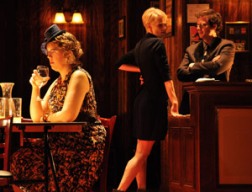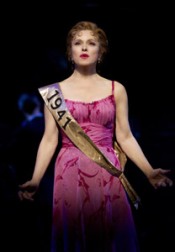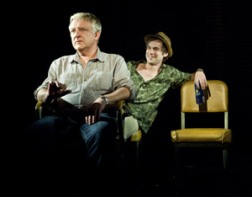Category: "Review"
Review: The Select (The Sun Also Rises)
Sep 15th
 Try as I might, I find it impossible to appreciate the Elevator Repair Service’s aesthetic. This enterprising downtown troupe has made a significant name for themselves in recent years with their theatrical adaptations of classic Americans novels, of which The Select (The Sun Also Rises) is the last in a trilogy. But like the highly acclaimed Gatz and The Sound and the Fury (April Seventh, 1928), their versions of Fitzgerald’s The Great Gatsby and Faulkner’s The Sound and the Fury, this staging of Ernest Hemingway’s classic 1926 novel is less interested in elucidating the text than in pointless gimmickry.
Try as I might, I find it impossible to appreciate the Elevator Repair Service’s aesthetic. This enterprising downtown troupe has made a significant name for themselves in recent years with their theatrical adaptations of classic Americans novels, of which The Select (The Sun Also Rises) is the last in a trilogy. But like the highly acclaimed Gatz and The Sound and the Fury (April Seventh, 1928), their versions of Fitzgerald’s The Great Gatsby and Faulkner’s The Sound and the Fury, this staging of Ernest Hemingway’s classic 1926 novel is less interested in elucidating the text than in pointless gimmickry.
Thankfully, this evening isn’t a word-for-word recitation of the novel, as with the case with the butt-numbing, daylong Gatz. But it does contain vast chunks of the book’s exposition and dialogue, and the three-and-a-half hour long running time feels endless.
Hemingway’s novel, you’ll recall, concerns a group of expatriates whiling away their days and nights in a Paris bar. They include American journalist Jake Barnes, the narrator and the author’s stand-in (Mike Iveson); Brett Ashley (Lucy Taylor), a sexually ravenous Brit; and Robert Cohn (Matt Tierney), a Jewish novelist and former Princeton boxing champ. Add to that such eccentric as a dashing bullfighter (Susie Sokol, in a cross-dressing turn) and a flamboyant Spanish hotelier (Vin Knight), and you have a colorful array of characters.
Director John Collins’ staging fails to either convey the strength of the novel or add anything imaginative in place of it. Primarily, the piece seems designed to show off the sound effects wizardry of Matt Tierney and Ben Williams, who have provided an array of noises to complement the largely mimed action--liquid being poured into glasses, the thumps of a fistfight, the cheers of a roaring crowd, etc. With the production of these effects often fully displayed, the result is that you feel you’re attending the taping of a lavishly staged radio show.
The acting ranges from bland (Barnes, Taylor) to over-the-top (nearly all of the supporting players), and neither the performances nor the anachronistic costumes sufficiently convey the period.
Clearly, Elevator Repair Service is a company that one either loves--as the New York Times certainly does--or hates, as evidenced by the numerous walkouts during intermission. But while one can certainly admire their ambition, not to mention the sheer stamina required for these efforts, it’s less easy to take pleasure in the strained, marathon results.
New York Theatre Workshop, 79 E. 4th St. 212-279-4200. www.ticketcentral.com.
Review: Follies
Sep 13th
 It’s been a mere ten years since the last Broadway incarnation of Stephen Sondheim and James Goldman’s Follies, but that ill-conceived version was lamentable enough to warrant another revival sooner than later. Thankfully, the Kennedy Center production has now arrived at the Marquis Theatre, and this beautifully staged, acted and sung rendition might well become the must-see hit that this brilliant if problematic show has never quite managed to be.
It’s been a mere ten years since the last Broadway incarnation of Stephen Sondheim and James Goldman’s Follies, but that ill-conceived version was lamentable enough to warrant another revival sooner than later. Thankfully, the Kennedy Center production has now arrived at the Marquis Theatre, and this beautifully staged, acted and sung rendition might well become the must-see hit that this brilliant if problematic show has never quite managed to be.
Unlike the last go-around, which was populated by fine actors but less than impressive singers (Gregory Harrison, Blythe Danner, Treat Williams and Judith Ivey), director Eric Schaeffer’s production doesn’t stint on the musical aspects of this musical. Staged on a lavish scale with a full orchestra, it gloriously brings Sondheim’s magnificent score to life.
The show, set during the reunion of Ziegfeld Girls-style chorines on the occasion of their former theater being slated for demolition, was originally conceived as a murder mystery. It eventually became a bittersweet portrait of two unhappily married couples whose emotionally charged dynamics, both past and present, are eventually mirrored in a series of old-style production numbers.
The show still doesn’t quite work, for the simple reason that James Goldman’s book never makes us sufficiently care about these drab characters and their marital fates.
But its haunting evocation of a bygone era of show business and brilliant score--which includes such classics as “Broadway Baby,” “I’m Still Here,” “Could I Leave You?” and “Losing My Mind”—are ample compensation, and these elements are beautifully realized here.
Schaeffer has assembled a superb cast, including Bernadette Peters, Jan Maxwell, Danny Burstein and Jan Maxwell as the unhappy couples; Elaine Page as the diva-like Carlotta; and a gallery of theater veterans, including Jayne Houdyshell, Florence Lacey, Mary Beth Peil and Terri White as the aged chorus girls reliving their former glory.
Peters is deeply moving as the troubled Sally, and her powerful renditions of such songs as “In Buddy’s Eyes” and “Losing My Mind” demonstrate yet again her superb abilities as a Sondheim interpreter. Maxwell looks impossibly glamorous and sexy as Phyllis, even while delivering such numbers as “Could I Leave You?” with a visceral intensity. Burstein displays a winning charm as the hapless Buddy, while Raines poignantly conveys the vulnerability underlying Benjamin’s bravado. And, as might be expected, Page knocks her show-stopping number “I’m Still Here” out of the park, as well as garnering consistent laughs along the way.
Although the sterile, modern Marquis Theatre would seem an ill-fit for this show, set designer Derek McLane has effectively drabbed it down by enveloping its entire environs with somber black tarpaulin. But he provides sufficient visual opulence for the second act, when the theater comes alive for a series of lavish production numbers. Gregg Barnes’ eye-popping costumes and Natasha Katz’s frequently haunting lighting are equally effective, as is Warren Carlyle’s choreography, especially for the intricate, beautifully realized “Loveland” and “Story of Lucy and Jessie” numbers.
There are times, especially in the slow-moving opening scene, when one wonders if director Schaeffer will be up to the task. But by the end of this powerful and gorgeous new Follies, all doubts have been removed.
Marquis Theatre, 1535 Broadway. 877-250-2929, www.Ticketmaster.com.
Review: Bluebird
Aug 23rd
 It seems almost criminal to take one of the English speaking theater’s finest classical actors, have him appear in a play in a tiny basement theater, and then make the run so limited that it sells out virtually immediately. But such is the case with the Atlantic Theater Company’s production of Bluebird, starring Simon Russell Beale.
It seems almost criminal to take one of the English speaking theater’s finest classical actors, have him appear in a play in a tiny basement theater, and then make the run so limited that it sells out virtually immediately. But such is the case with the Atlantic Theater Company’s production of Bluebird, starring Simon Russell Beale.
It’s rare--certainly on these shores--for Beale to play contemporary roles, but he does so in this 1998 drama by Simon Stephens that was originally produced at London’s Royal Court Theatre. The actor stars as Jimmy, a London taxi driver whose placid demeanor and casual chattiness belies a raging turmoil underneath.
For much of the play’s 100-minute running time, the action consists of Jimmy’s interactions, ala Travis Bickle in Taxi Driver, with a variety of eccentric passengers, or, as he refers to them, “fares.” They include, among others: the grieving father (Michael Countryman) of a murdered young girl; a hard-edged but flirtatious prostitute (Charlotte Parry); a burnt-out engineer (Todd Weeks) for the London Underground and a menacing bouncer (John Sharian).
Periodically, Jimmy leaves his taxi to make plaintive phone calls to a woman we eventually learn is his ex-wife (Mary McCann). At first, she refuses to talk to him, but eventually she relents and agrees to a late night drive.
It’s this final confrontation, in which we learn the true nature of Jimmy’s demons, which forms the dramatic heart of the play. But while this climactic scene is indeed powerful, the play takes too long in getting there. Besides the unlikelihood of Jimmy’s being able to draw enough self-revealing monologues from his passengers to fill a season’s worth of HBO’s Taxicab Confessions, the encounters themselves are either overly contrived or simply dull. For too long, Beale has little to do other than provide vaguely bemused reactions.
Still, the final scene, beautifully acted by Beale and McCann, does pack a dramatic punch. And the intimacy of the theater indeed serves this miniaturist drama well. Bluebird is not a great play, but it stars a great actor, so do whatever you have to do to procure tickets.
Atlantic Stage 2, 330 W.16 th St. 212-279-4200. www.ticketcentral.com.
Review: Olive and the Bitter Herbs
Aug 17th
 If Charles Busch’s artistic to the late Charles Ludlam was made evident by such parodies as Vampire Lesbians of Sodom and Red Scare on Sunset, then his latest effort reveals the influence of another comedic master, Neil Simon. Like his hit Broadway play The Tale of the Allergist’s Wife, Olive and the Bitter Herbs combines hilarious jokes with just enough heart to elevate it above mere sitcom level. As performed by an expert troupe of farceurs in this Primary Stages production, it’s a consistently fun romp.
If Charles Busch’s artistic to the late Charles Ludlam was made evident by such parodies as Vampire Lesbians of Sodom and Red Scare on Sunset, then his latest effort reveals the influence of another comedic master, Neil Simon. Like his hit Broadway play The Tale of the Allergist’s Wife, Olive and the Bitter Herbs combines hilarious jokes with just enough heart to elevate it above mere sitcom level. As performed by an expert troupe of farceurs in this Primary Stages production, it’s a consistently fun romp.
As might be gleaned from the title, the play’s centerpiece is a Passover Seder conducted by the titular character (Marcia Jean Kurtz), an aging character actress whose biggest claim to fame is a starring role in a definitely non-kosher sausage commercial.
Among the guests are a wacky group of characters including Wendy (Julie Halston), Olive’s friend who puts up with her acerbic manner; Trey (Dan Butler) and Robert (David Garrison), the gay couple next door whose monthly cheese binges drive Olive to distraction due to the smell; and Sylvan (Richard Masur), a courtly three-time widower visiting from Buenos Aires who soon develops a romantic interest in her.
The slight premise binding both the characters and plot is the spectral presence in Olive’s living room mirror, apparently the ghost of Wendy’s late brother, Howard. As is eventually revealed in a riotously funny if over-the-top climactic scene, it turns out that all of the characters have had fateful interactions with Howard, affecting their relationships in vastly different ways.
This effort doesn’t have much more depth than Busch’s last comedy, the religious movie spoof The Divine Sister. But the playwright is so adept at crafting facile one-liners that it’s easy to overlook the flimsy set-ups. As delivered by the expertly comedic cast under the direction of Mark Brokaw, they produce a steady stream of laughs, perhaps the biggest of which comes from the simple phrase “Gimme the sausage.” To get that joke, you’ll have to see the show.
59E59 Theaters, 59 E.59th St. 212-279-4200. www.primarystages.org.
Review: Rent
Aug 15th
 Anyone who saw Rent in its original incarnation at the New York Theatre Workshop will no doubt be discomfited to see that it has now become a theatrical brand. Just three years after it closed on Broadway after a twelve-- year run, it has returned in a fresh production at the New World Stages, that subterranean theatrical venue where dead or dying Main Stem shows go to be reborn.
Anyone who saw Rent in its original incarnation at the New York Theatre Workshop will no doubt be discomfited to see that it has now become a theatrical brand. Just three years after it closed on Broadway after a twelve-- year run, it has returned in a fresh production at the New World Stages, that subterranean theatrical venue where dead or dying Main Stem shows go to be reborn.
The revival, its producers have freely admitted, is born less of creative than financial reasons. Although some of its technical elements have been rejiggered and a fresh young cast has been assembled, this is essentially the same show that existed before, with original director Michael Greif once again holding the reins.
As a purely commercial venture, it’s likely to succeed. Rent was a touchstone for a certain generation when it premiered in 1996, and a new younger audience seems prepared to embrace it as well. Its milieu of a rundown, drug-ridden East Village has largely been obliterated by gentrification—even at its premiere the work had a nostalgic tinge. By now, its setting is probably as exotic to younger audiences as the 19th century Paris of its inspiration, La Boheme.
This tale of a ragtag group of artists dealing with poverty, drug addiction and AIDS, among other things, was always hampered by its rather unwieldy book and scattershot characterizations. What made it work originally--besides the emotional impact of creator Jonathan Larson’s sudden death the night before the first preview—was the truly exciting rock music score and the pitch-perfect performances by a largely unknown cast, many of whom would go on to stardom.
Larson’s score, performed here as it was before by a five-piece band, is still a powerhouse, but its impact is somewhat lessened by muddy acoustics that often render the lyrics incomprehensible. But it doesn’t seem to matter to its viewers, who lustily cheered when they heard the familiar opening notes of the show’s anthem, “Seasons of Love.”
The young ensemble, competing with the memories of such breakout stars from the original as Taye Diggs, Idina Menzel, Jesse L. Martin, Daphne Rubin-Vega and Anthony Rapp (most of whose performances were preserved in the ill-fated 2005 film version), certainly bring raw energy to the proceedings. Sadly, they mostly pale in comparison to their predecessors: the exceptions are Adam Chanler-Berat, whose eerie resemblance to Larson (accentuated by a similar haircut), brings an emotional frisson to his turn as the filmmaker Mark; and Annaleigh Ashford, whose giddy exuberance as the performance artist Maureen is an interesting contrast with Menzel’s more acerbic interpretation.
Rent fanatics will notice that the once largely open set design has been replaced by one divided into smaller configurations that more evocatively convey the cramped apartments of the East Village, and that the lighting and choreography are altered, to not much different effect.
It was probably silly to hope that a fresh approach would have been applied to a clearly successful concept. But it’s also a shame that this Rent feels like more of a museum piece than the wonderfully vital revival of Hair that is currently competing for those nostalgia dollars.
New World Stages 340 W.50th St. 212-239-6200. www.telecharge.com.